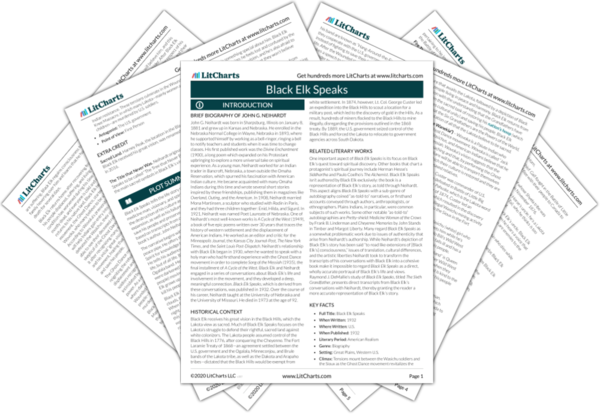“Yellow metal,” or gold, symbolizes the Wasichus’ (white peoples’) greed and, by extension, the looming threat that this greed poses to the Lakota people. When gold is discovered in the Black Hills during an expedition led by Custer in 1874, hundreds of Wasichu miners flock to the Hills in search of wealth, despite a 1868 treaty that reserved this land for the Lakotas. When Black Elk mentions the “yellow metal that makes the Wasichus crazy,” he expresses disdain for the specific problems this craziness for gold causes for his people (stolen land and broken treaties), as well as a more general disapproval of the Wasichus’ worldview: to Black Elk, the Wasichus obsession with gold symbolizes their disrespect of his people and their disregard for the earth.
By extension, objects that Black Elk describes as “bright” or “shining” also evoke gold and greed. For example, when Black Elk visits London while touring with Buffalo Bill’s Wild West Show, he meets Grandmother England (Queen Victoria of Great Britain) who, he notes, wears a “shining” dress and hat, which presumably refers to the gold or jewels with which the garments are adorned. Although Grandmother England is arguably one of the kinder Wasichus with whom Black Elk interacts, the “shining” quality of her attire evokes the greed and excess of Wasichu culture that the British Crown epitomizes.
Yellow Metal / Gold Quotes in Black Elk Speaks
Once we were happy in our own country and we were seldom hungry, for then the two-leggeds and the four-leggeds lived together like relatives, and there was plenty for them and for us. But the Wasichus came, and they have made little islands for us and other little islands for the four-leggeds, and always these islands are becoming smaller, for around them surges the gnawing flood of the Wasichu; and it is dirty with lies and greed.

Unlock explanations and citation info for this and every other Black Elk Speaks quote.
Plus so much more...
Get LitCharts A+Our people knew there was yellow metal in little chunks up there; but they did not bother with it, because it was not good for anything.
I can remember when the bison were so many that they could not be counted, but more and more Wasichus came to kill them until there were only heaps and heaps of bones scattered where they used to be. The Wasichus did not kill them to eat; they killed them for the metal that makes them crazy, and they took only the hides to sell. Sometimes they did not even take the hides to sell. Sometimes they did not even take the hides, only the tongues; […] they just killed and killed because they liked to do that. When we hunted bison, we killed only what we needed. And when there was nothing left but heaps of bones, the Wasichus came and gathered up even the bones and sold them.












